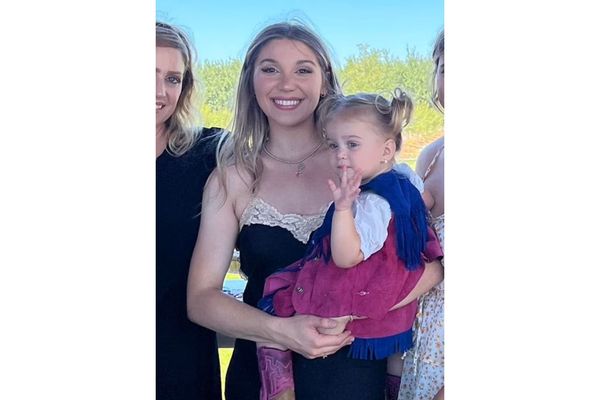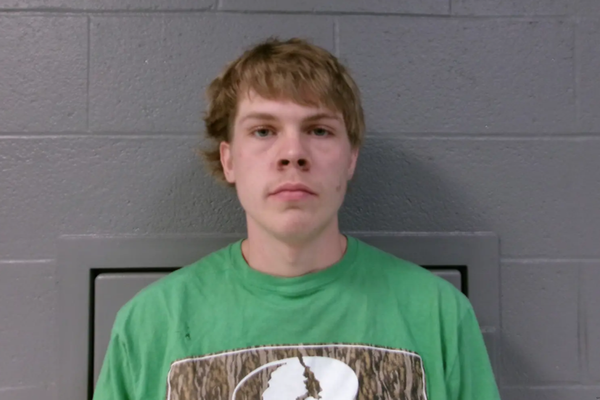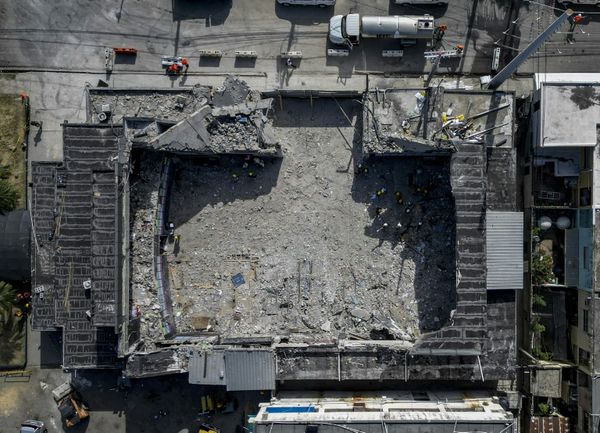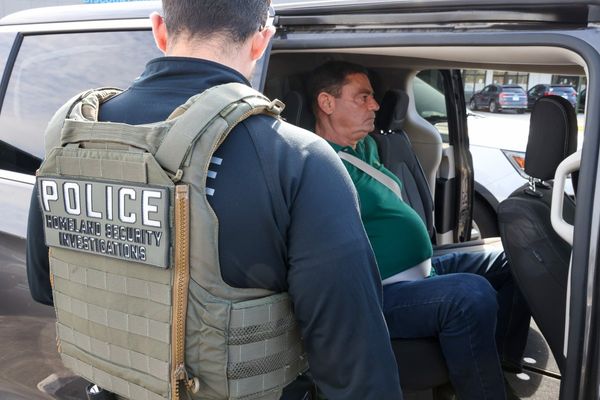
and Siena Kelly in four of the six new episodes of Charlie Brooker’s Black Mirror. Composite: Netflix
Black Mirror (Netflix)
Doctor Who (BBC One) | iPlayer
What They Found (BBC Two) | iPlayer
Simon Schama: The Road to Auschwitz (BBC Two) | iPlayer
Reunion (BBC One) | iPlayer
Looming back for a seventh series, what has Charlie Brooker and Annabel Jones’s Black Mirror become? Streamer-binge futuristic dystopia for doom-scrolling millennials? Whatever it is, can it compete with the crazed reality of the Trump era?
The latest six instalments of the anthology, all written/co-written by Brooker, start strongly with Common People, a socioeconomic horror allegory taking aim at the uber-monetised US health system. A desperate couple (Rashida Jones and Chris O’Dowd) seek help from a medical tech company but find themselves navigating a labyrinthine nightmare of escalating pricing tiers, adverts and algorithms that become more farcical and grotesque by the minute.
Bête Noire is an offbeat geek revenge fantasy starring Siena Kelly as an executive at a chocolate company whose former schoolmate (a sinister Rosy McEwen) turns up at her work. Plaything harks back to Black Mirror’s 2018 interactive Bandersnatch and features a video game-obsessed Brooker proxy (a straggly haired Peter Capaldi playing older; Lewis Gribben younger) in what becomes a seething diatribe against human cruelty. Elsewhere, Hotel Reverie delivers a pastiche on old Hollywood mores, with Brandy (Issa Rae) beamed in via ultra tech to star in a classic black and white movie opposite Dorothy (Emma Corrin channelling Brief Encounter’s Celia Johnson). Lavish, touching – a bouquet thrown to the silver screen – it struggles to fill 75 minutes.
Eulogy stars Paul Giamatti as a man sucked into old photos to reflect on a doomed amour. A deliciously cynical weepie (some photos have been burned with cigarettes), this is taut storytelling with a bristling central performance. The series ends with Black Mirror’s first sequel: to series four’s Star Trek-adjacent USS Callister, in which (spoiler alert) office staff are cloned to star in a space game by deviant co-worker Robert Daly (Jesse Plemons), who dies at the end. In this feature-length follow-up, the crew clones, including Nanette (Cristin Milioti, recently superb in The Penguin), Karl (Billy Magnussen) and Milanka (Elena Tulaska), find themselves in more digital intergalactic trouble in a tale that includes an unexpected guest appearance.
One or two episodes need tightening up (I almost dozed off during Bête Noire), but overall Black Mirror remains inventive, entertaining TV. I’m not sure it can claim to reflect our times, but what could?
The opening adventure of the new series of Doctor Who (BBC One), The Robot Revolution (scripted by showrunner Russell T Davies), finds the Doctor with a new companion, nurse Belinda, played by Varada Sethu (who also appeared in a previous episode, Boom), making it the first time people of colour are sole occupiers of the Tardis.
A lively, somewhat overcomplicated story features malevolent robots, rockets, planets, AI, even incels and a cheeky camp nod to Kylie Minogue’s Padam Padam. At times it’s too busy, like watching a sci-fi fairground in full swing (plot lines whirling everywhere). Then again, the Doctor and Belinda have intriguingly abrasive chemistry (“There’s always a doctor standing back while the nurses do all the hard work”), so this could get interesting.
In a week of firsts, director Sam Mendes (1917, Spectre) delivers his debut documentary, What They Found (BBC Two), to mark the 80th anniversary on 15 April of the liberation of the Nazis’ Bergen-Belsen concentration camp where 52,000 people, mainly Jewish, died. Executive-produced by David Baddiel, it uses archive footage from the Imperial War Museum, as well as spoken recollections from two sergeants, Mike Lewis and Bill Lawrie, who acted as cameramen for the British army’s Film and Photographic Unit in 1945.
The 40-minute film is stark and disturbing. Lewis and Lawrie, speaking in the 1980s, convey how it felt to see the naked corpses and emaciated survivors. Lewis, himself Jewish, says: “There was a stench of death and the death of all human dignity and hope.” “What we saw weren’t people,” adds Lawrie. “They were what was left of people…” Mendes, who has Jewish ancestry, keeps the film raw, stripped back, allowing the footage of the camp and witness testimonies to own every charged, terrible moment.
Another Holocaust documentary, Simon Schama: The Road to Auschwitz (BBC Two), demonstrates how the Auschwitz-Birkenau extermination camp, where more than 1.1 million people were murdered, wasn’t the start of the Holocaust. An earlier genocide had been unfolding for years across Europe, in countries such as Lithuania, Poland and Romania, with persecution and mass shootings of Jewish people, often with the complicity of local communities.
Historian Schama, who is Jewish, interviews one of the dwindling number of survivors, Marian Turski (who died a few months later). He makes his first visit to the camp: “It’s finally time to face the monster.” At one point, Schama vents his rage: “Pity is what others who aren’t Jews feel. Screw the pity!” The Mendes and Schama documentaries employ different approaches, but together they serve as a powerful riposte to Holocaust denial and the global rise of antisemitism.
Reunion, on BBC One, is a groundbreaking four-part thriller created by deaf writer William Mager. Set in Sheffield, it combines a hearing and a deaf cast who use British Sign Language. Daniel, recently released from prison for killing his friend, is brilliantly played by deaf actor Matthew Gurney. Anne-Marie Duff is Christine, the dead man’s widow; her daughter is played by Rose Ayling-Ellis, the EastEnders actor who won Strictly Come Dancing in 2021. Eddie Marsan lurks as a former police detective, and Christine’s love interest. Daniel’s angry abandoned daughter, Carly, is played by Lara Peake.
While the plot gets a little convoluted, the performances feel real. The deaf element (long emotional conversations are signed) gives Reunion a sense of harrowing isolation, with occasional muffled sounds adding to the intensity. Far from being a distraction, the signing adds another atmospheric layer. It’s an interesting piece, well worth a look.
Star ratings (out of five)
Black Mirror ★★★★
Doctor Who ★★★
What They Found ★★★★
Simon Schama: The Road to Auschwitz ★★★★
Reunion ★★★
What else I’m watching
Your Friends and Neighbours
(Apple TV+)
Jon Hamm (Mad Men) stars in a dark, left-field comedy drama about a suave hedge fund manager who, on being fired, burgles the homes of his wealthy social circle.
Hacks
(Sky Max)
Fourth series of the acidly witty showbiz comedy starring Jean Smart and Hannah Einbinder. If you’re not already watching this, you’re seriously missing out.
Celebrity Big Brother
(ITV1)
Jaw-dropping scenes as Hollywood legend turned boxer Mickey Rourke stalks the Celebrity Big Brother house in his Stetson and cowboy boots alongside singer Chesney Hawkes and former Olympian Daley Thompson, among others.







